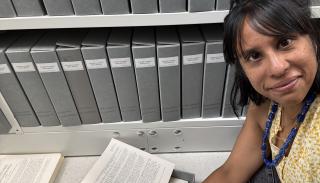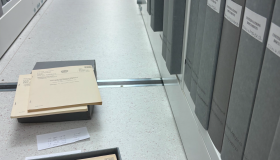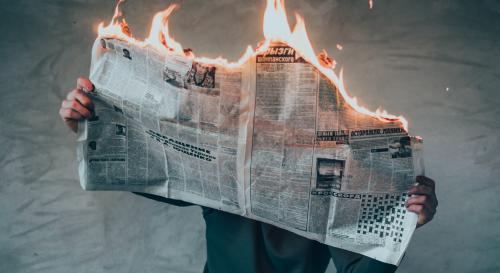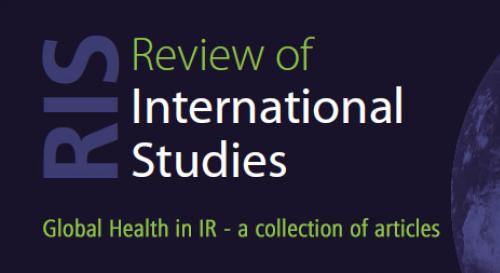
Breadcrumbs navigation
Ecocide: a 21st century international crime in the making?
Suwita Hani Randhawa was awarded a BISA Early Career Small Research Grant (ECSRG). The grant allowed Suwita to research the criminalisation of ecocide in global politics. Here she discusses the research and her conclusions.
After the end of the Second World War, four specific acts were recognised as ‘international crimes’: aggression, crimes against humanity, genocide and war crimes. Since then, no further acts have been accorded this special legal status. Against the background of a global ecological emergency, however, Stop Ecocide International (SEI) has been leading a global campaign pushing for mass damage and destruction of the natural living world to be recognised as a new international crime of ecocide. This is perceived as necessary for achieving meaningful climate justice, as it would subject the mass environmental destruction to the same legal consequences that uniquely attach to the existing international crimes, namely: prosecution and punishment by the International Criminal Court (ICC). To this end, SEI has been pushing for the Rome Statute, the ICC’s founding treaty, to be amended to include ecocide as an additional crime falling under the Court’s jurisdiction.
These developments have been accompanied by an explosion of academic interest in ecocide. What has yet to receive adequate attention, however, is an analysis of ecocide’s ongoing criminalisation in global politics – put differently, its evolving construction as an international crime by global social actors. This is surprising, especially when we consider how ecocide’s ascendancy within global politics constitutes an unparalleled politico-legal moment. Contemporary calls to criminalise ecocide under international law are unique for being the only instance of international criminalisation since the end of the Second World War. Arguably, we are currently witnessing the most sustained and concerted effort to radically transform the field of international criminal justice to date, through the establishment of a new international crime. Furthermore, as ecocide’s passage to becoming an international crime is far from complete, it thus presents the rare opportunity to examine an instance of international criminalisation in our times that is still in the process of unfolding.
This research project thus investigates the criminalisation of ecocide in global politics. Conceptually, the study is based upon my earlier theoretical work on international criminalisation, which seeks to explain how and why this process unfolds in global politics. In this framework, international criminalisation is understood as a historical process through which international criminal norms are constructed by social actors and are thereafter translated into an international legal proscription. This historically informed perspective, which also emphasises the social and norm-making aspects of international criminalisation, is operationalised through documentary analysis, specifically of United Nations (UN) documents from the 1970s to the late 1990s. In terms of its significance, this study preliminary findings challenges the burgeoning literature on ecocide in three central ways.

First, existing accounts of ecocide are underpinned by a legalistic view of international criminalisation, wherein an international crime is only deemed to be in existence if there is an identifiable international legal rule to this effect. This not only explains why the focus of SEI’s efforts have been directed at a formal legal amendment to the Rome Statute on ecocide. It also accounts for why much of the existing literature to date has been directed at unpacking how a new international crime of ecocide can be accommodated within the legal framework of the Rome Statute. What this perspective misses, however, is an appreciation that the legal enshrinement of an international crime is preceded by a much longer process of norm-creation, in which the emergence of a global consensus on ecocide’s criminality represents the more critical stage in the overall process that culminates in the formal recognition as an international crime. In ecocide’s case, much of the heavy-lifting work aimed at its criminalisation takes place – and indeed, has been taking place across a much longer historical period – in spaces beyond the formal world of legal rules, legal treaties and legal definitions. Crucially, then, although an international legal rule that explicitly provides ecocide constitutes an international crime does not yet exist, its process of international criminalisation has been underway for much longer than is conventionally acknowledged. On this basis, therefore, I suggest ecocide ought to be understood as an ‘international crime in the making’.
Second, a dominant narrative about ecocide’s historical evolution in global politics is fast crystallising in the existing literature. As the story goes, following the coining of the term ‘ecocide’ by the American biologist Arthur Galston in 1970, the first significant effort to recognise ecocide as an international crime centred on Richard Falk’s proposal for an international treaty on ecocide in 1973. This did not gain much traction, however, and ecocide was consequently consigned to the margins of global politics for several decades. Revived global interest in ecocide only developed when Polly Higgins, a British environmental lawyer, published her book Eradicating Ecocide: Laws and Governance to Prevent the Destruction of Our Planet in 2010, in which she argued for ecocide’s criminalisation under international law. To support its establishment as an international crime, Higgins co-founded Stop Ecocide International with Jojo Mehta in 2017. To be sure, these developments form an important part of ecocide’s history; however, this narrative obscures the richer and complex history that ecocide has undergone in global politics. As archival research shows, ecocide has been consistently present in global politics and was the subject of diplomatic debates across several major spheres of international relations, including genocide, global disarmament, armed conflict, and the codification of international law. Importantly, the twists and turns of ecocide’s journey in these multiple realms far predate its principal site of existence in contemporary times, namely, within the sphere of international criminal justice.
Third, the conventional narrative on ecocide’s history centres heavily on the efforts of a select number of key individuals: Arthur Galston, Richard Falk, Polly Higgins and Jojo Mehta. Their work and activism, moreover, is portrayed as being critical for galvanising global interest in a new international crime of ecocide. Indeed, it would be remiss not to draw attention to how all four are white, educated individuals from the Western world. As the principal movers and shakers within ecocide’s history, these individuals are depicted as ‘eco-heroes’, radical visionaries of their times with the foresight that the enduring problem of environmental destruction requires an altogether new solution, namely: the creation of a new crime of ecocide. Given the specificity of their shared objective, ecocide’s ‘Big Four’ are not simply norm entrepreneurs, agents with strong notions about appropriate or desirable behaviour and who try to turn their favoured ideas into new norms by persuading other actors to embrace them. Rather, they are better characterised as ‘agents of criminalisation’: social actors who actively construct international crimes, by persuading a wider global audience that a particular act deserves this special status. However, when we uncover what the dominant narrative on ecocide’s history eclipses, what becomes evident is that the ‘Big Four’ are far from the only actors who have pushed for ecocide’s criminalisation across its history. In what has not been significantly appreciated as critical junctures within ecocide’s history, the unsung heroes of its international criminalisation have been international legal diplomats, largely obscured from the visual register of global politics and whose contributions are buried within the archives of international diplomacy.
Photos by Suwita Hani Randhawa


